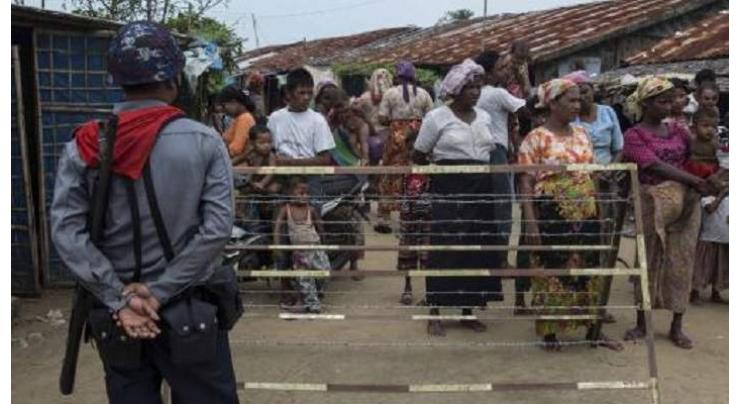
Some 3,000 Beds Being Prepared Across Refugee Camps In Bangladesh Amid COVID-19 - WHO
Faizan Hashmi Published October 12, 2020 | 04:52 PM

Valentina Shvartsman - Some 3,000 hospital beds for COVID-19 patients in multiple facilities, including unfinished ones, are being readied in Bangladesh's Cox's Bazar district that hosts the world's largest refugee camps amid the continuing pandemic, Catalin Bercaru, a communication and media relations officer for the World Health Organization (WHO) country office in Bangladesh, told Sputnik
MOSCOW (UrduPoint News / Sputnik - 12th October, 2020) Valentina Shvartsman - Some 3,000 hospital beds for COVID-19 patients in multiple facilities, including unfinished ones, are being readied in Bangladesh's Cox's Bazar district that hosts the world's largest refugee camps amid the continuing pandemic, Catalin Bercaru, a communication and media relations officer for the World Health Organization (WHO) country office in Bangladesh, told Sputnik.
As of October 4, a total of 273 cases have been confirmed among Rohingya refugees living in the camps.
"WHO supported Government and humanitarian partners to establish 14 Severe Respiratory Infection Isolation and Treatment Centres (SARI ITC) facilities in and outside the camps, with a capacity for 946 beds. Of these, 512 are ready to receive patients and another 453 are in place and held on standby. Five isolation facilities provide additional 72 beds. Construction of SARI ITC sites is expected to be completed by November 2020," Bercaru said in an email.
"Also, the Intensive Care Unit/High Dependency Unit Facility at District hospital is now operational with ten ICU and eight HDU beds. Additionally, 6 quarantine centers are operational with a capacity of over 2,000 people," he added.
The testing capacity in the district has also been ramped up.
"WHO constantly contributed to scale up testing and contact tracing capacities and currently the field laboratory at Cox's Bazar Medical College has a capacity of 1,500 tests per day, with staff working in two shifts and operating 3 PCR machines," Bercaru said.
As part of preventive measures, more than 1.3 million Rohingya refugees and vulnerable Bangladeshi population living in Cox's Bazar district have received reusable cloth masks, the official said.
"2,7 million cloth masks have been distributed to 745,000 Rohingya individuals and 626,000 vulnerable Bangladeshi from nearby communities," Bercaru said in an email.
Other measures taken by WHO and local health sector included infection prevention and control training for over 2,500 health workers. Meanwhile, more than 1,500 refugee community health work volunteers have received training on COVID-19 and now work at camps to share key messages with refugees. Their efforts are being supported by over 400 protection community outreach workers along with Imams and community leaders. Apart from that, radio spots, video, posters and messages in Rohingya, Burmese and Bengali are used to inform residents of the camps about how the virus transmits and how people can protect themselves against it.
"Hygiene promotion continues in the camps, and all partners are ensuring that water and soap is readily available to all. Additional measures, such as increasing the number of hand-washing facilities in distribution centres, [and] health points are being introduced. Physical distancing measures have also been put in place at all distribution points," Bercaru said.
More than 860,000 Rohingya refugees are currently living in camps in Cox's Bazar after being forced to flee their homes in neighboring Myanmar amid an army offensive in August 2017. The Myanmar authorities launched an unprecedented violent campaign against this Muslim minority after militants, allegedly from this minority group, carried out attacks on police posts in the country's north-western state of Rakhine.
Related Topics
Recent Stories

Tennis: ATP Barcelona Open results - 1st update

Swiatek's perfect 10 in Stuttgart as Vondrousova stuns Sabalenka

Arandu's roads closed due to flooding

Oil tanker catches fire in Islamabad’s Blue Area

Pakistan committed to ensure safety of foreign nationals: FO

Tennis: WTA Stuttgart results - 1st update

Four passengers injured as train hit an empty vehicle

Over- speeding bus crushed to death two bike riders

Turkey's Freedom Flotilla ready to set sail for Gaza

French teen dies from heart failure after knife attack near school

Iranians appear unfazed by Isfahan blasts

UAF celebrates Int'l Chinese Language Day
More Stories From World
-
Togo lawmakers approve contested political reform
3 hours ago -
NATO must choose 'whether we indeed are allies': Zelensky
3 hours ago -
US House to vote on Ukraine, Israel, Taiwan aid package
3 hours ago -
Calls for calm after reported Israeli strike on Iran
3 hours ago -
IMF calls on EU to deepen single market integration to boost growth
3 hours ago -
Second Ecuadoran mayor killed ahead of anti-crime referendum: police
3 hours ago
-
Oil, gas drilling blocked in Alaska wilds as Biden seeks green cred
4 hours ago -
Man sets self on fire outside Trump trial
4 hours ago -

Turkey's Freedom Flotilla ready to set sail for Gaza
5 hours ago -

French teen dies from heart failure after knife attack near school
5 hours ago -

Iranians appear unfazed by Isfahan blasts
5 hours ago -

Ecuador mayor killed ahead of anti-crime referendum: police
6 hours ago



